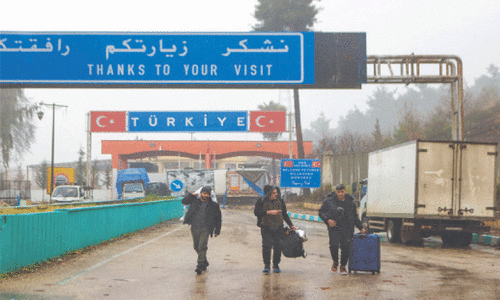SAN JUAN (Puerto Rico): Three years ago, the man known as Internment Serial Number 669 stopped eating.
Ahmed Zaid Zuhair, a father of 10 in Saudi Arabia and Yemen, had been held at Guantanamo Bay since 2002 without charges and decided to join a mass hunger strike in protest. The US military was determined not to let him succeed.
Since then, according to court documents, guards have struggled with him repeatedly, at least once using pepper spray, shackles and brute force to drag him to a restraint chair for his twice-daily dose of a liquid nutrition mix force-fed through his nose.The documents, filed in federal court in Washington, are a rare look at the military tactics used on hunger strikers, which have sparked international condemnation but remained hidden from view, with officials refusing to even confirm the identity of the men taking part in the protest.
Zuhair’s attorney, Yale Law School lecturer Ramzi Kassem, says the tactics described in the documents amount to “cruel, inhuman and degrading treatment”. The military says the only reason it uses such tactics is that Zuhair is violent and dangerous.
“ISN 669 has a very long history of disciplinary violations and non-compliant, resistant and combative behavior,” according to Colonel Bruce Vargo, commander of Guantanamo Bay’s guards.
Zuhair’s protest is the remnant of a mass hunger strike at Guantanamo Bay that began in the summer of 2005, with prisoners celebrating the 10 Irish Republican Army and Irish National Liberation Army militants who starved themselves to death in Britain’s Maze prison in 1981 while demanding political-prisoner status.
At its peak, there were 131 prisoners refusing meals at the US Navy base in Cuba. The US began force-feeding prisoners, but some were regurgitating the liquid-nutrient mix. In Jan 2006, commanders adopted a practice borrowed from American civilian prisons of strapping detainees into a special restraint chair for the feeding, and the number of strikers quickly dropped off.
Eventually there were just two: Zuhair, 43, and another Saudi, Abdul Rahman Shalabi. The number has since fluctuated and 12 were participating last week.
A number of prisoners have alleged brutal treatment during the hunger strike, and lawyers and human rights groups have accused guards of using unnecessary force. Kassem and other attorneys say their clients have mostly complied with the force-feeding, and that the US has used rough treatment in an effort to break the strike.
Physicians for Human Rights, the World Medical Association and the United Nations, among others, have condemned the use of restraint chairs and other tactics as a violation of US law and basic human rights principles.
The US military has denied any abuse, though it has offered few if any details about what happens between guards and prisoners behind the coiled-razor wire.
Navy Cmdr Pauline Storum, a spokeswoman for the detention centre, said on Friday the military was required “under federal law and Department of Defence policy, to preserve the health and well-being of all detainees under our control”.
“When a detainee refuses to comply with guard instructions to leave his cell in order to receive necessary medical care, we will use the minimum force necessary ... in order to preserve life,” including by tube feeding, she said.
And while the US considers the detainees “enemy combatants” for whom the Geneva Conventions do not apply, it maintains it treats them in a humane manner that in some ways exceeds international standards.
The court documents, affidavits and filings recently submitted as part of Zuhair’s challenge of his confinement provide the first detailed picture of his struggles with guards.
On the evening of July 17, for example, two navy sailors took Zuhair to be fed. When they finished, they say the 5-foot-5, 136-pound, Zuhair violently squirmed to avoid being taken back to his cell. He cursed at them and said his shackles were too tight.
They searched him for contraband and put him back in his cell, they said, and he responded with chilling words: “Come in my cell, I will cut off your head,” he said in English, according to their account. “You are scared. I can tell. Come in my cell. I will cut off your head.”
Four weeks later, on Aug 14, Zuhair refused to come out of his cell for a force-feeding in what his lawyer described as a protest against rough treatment of the hunger strikers.
Five guards strapped on body armour, helmets and face shields and went in for him. One guard shot pepper spray through a hole in the door, but Zuhair knocked away the can. The five men wrestled him to the ground.
“He fought briefly with the guards before five of them were able to place him on his stomach,” an officer said. “It took an additional several minutes to shackle ISN 669.”
The court documents describe other clashes involving Zuhair. One day in June, he “became aggressive and tried to break free” from guards, the military said.
Navy captain Bruce Meneley, the doctor in charge of prisoner care, said wounds on Zuhair’s head and face were stitched up after “scuffles” with guards in April 2003 and January last year.
Zuhair was captured in Pakistan and taken to Guantanamo in June 2002. He has not been charged with a crime, although the military says he trained with the Taliban and Al Qaeda in Afghanistan and was a member of a Muslim fighting group in Bosnia in the mid-1990s that received money from Khalid Sheikh Muhammed, the confessed mastermind of the Sept 11 attacks.
The US also claims he was involved in the Nov 1995 shooting death of an American U.N. employee, William Jefferson, in Bosnia.
Zuhair denies the allegations. In addition to seeking his release, his legal team has asked for his medical records, an examination by an independent doctor and surveillance video that might support his claims of mistreatment. The US military has refused.—AP














































Dear visitor, the comments section is undergoing an overhaul and will return soon.